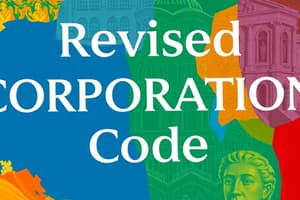Podcast
Questions and Answers
According to the Revised Corporation Code of the Philippines, what is a stock corporation?
According to the Revised Corporation Code of the Philippines, what is a stock corporation?
- A corporation that is not authorized to allotments of surplus profits
- A corporation that cannot distribute dividends
- A corporation with capital stock divided into shares (correct)
- A corporation without capital stock
What is the main characteristic of nonstock corporations under the Revised Corporation Code of the Philippines?
What is the main characteristic of nonstock corporations under the Revised Corporation Code of the Philippines?
- They cannot be formed under this Code
- They are not subject to any laws
- They have no right of succession
- They do not have capital stock divided into shares (correct)
Which term refers to a being created by operation of law with the right of succession under the Revised Corporation Code of the Philippines?
Which term refers to a being created by operation of law with the right of succession under the Revised Corporation Code of the Philippines?
- Person
- Legal entity
- Natural being
- Corporation (correct)
Corporations created by special laws or charters in the Philippines are primarily governed by:
Corporations created by special laws or charters in the Philippines are primarily governed by:
Under the Revised Corporation Code, what defines a corporation as an artificial being?
Under the Revised Corporation Code, what defines a corporation as an artificial being?
What is the key difference between Corporators and Incorporators?
What is the key difference between Corporators and Incorporators?
In what circumstances can shares be deprived of voting rights?
In what circumstances can shares be deprived of voting rights?
What are the matters on which holders of nonvoting shares are entitled to vote?
What are the matters on which holders of nonvoting shares are entitled to vote?
Under what conditions are corporations not permitted to issue no-par value shares of stock?
Under what conditions are corporations not permitted to issue no-par value shares of stock?
What advantage do preferred shares have over common shares during liquidation?
What advantage do preferred shares have over common shares during liquidation?
Flashcards
Corporation
Corporation
An artificial being created by law, with succession rights and legal powers.
Stock Corporations
Stock Corporations
Corporations with capital stock divided into shares, authorized to distribute dividends.
Nonstock Corporations
Nonstock Corporations
Corporations without capital stock divided into shares.
Corporations by Special Law
Corporations by Special Law
Signup and view all the flashcards
Corporators
Corporators
Signup and view all the flashcards
Incorporators
Incorporators
Signup and view all the flashcards
Shares Classification
Shares Classification
Signup and view all the flashcards
Rights of Nonvoting Shares
Rights of Nonvoting Shares
Signup and view all the flashcards
Study Notes
General Provisions
- The Revised Corporation Code of the Philippines is the title of the code.
- A corporation is an artificial being created by operation of law, having the right of succession and powers, attributes, and properties authorized by law or incidental to its existence.
Classification of Corporations
- Corporations formed or organized under this code may be stock or nonstock corporations.
- Stock corporations have capital stock divided into shares and are authorized to distribute dividends or allotments of surplus profits to shareholders.
- Nonstock corporations are all other corporations that do not have capital stock divided into shares.
Corporations Created by Special Laws or Charters
- Corporations created by special laws or charters are governed primarily by the provisions of the special law or charter creating them, supplemented by the provisions of this code.
Corporators and Incorporators, Stockholders and Members
- Corporators are those who compose a corporation, whether as stockholders or shareholders in a stock corporation or as members in a nonstock corporation.
- Incorporators are those stockholders or members mentioned in the articles of incorporation as originally forming and composing the corporation and who are signatories thereof.
Classification of Shares
- The classification of shares, their corresponding rights, privileges, or restrictions, and their stated par value must be indicated in the articles of incorporation.
- Each share is equal in all respects to every other share, except as otherwise provided in the articles of incorporation and in the certificate of stock.
- Shares in stock corporations may be divided into classes or series of shares, or both.
- No share may be deprived of voting rights except those classified and issued as "preferred" or "redeemable" shares, unless otherwise provided in this code.
- Holders of nonvoting shares are entitled to vote on certain matters, such as amendment of the articles of incorporation, adoption and amendment of bylaws, and dissolution of the corporation.
Studying That Suits You
Use AI to generate personalized quizzes and flashcards to suit your learning preferences.




